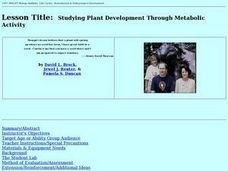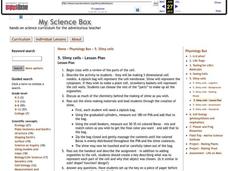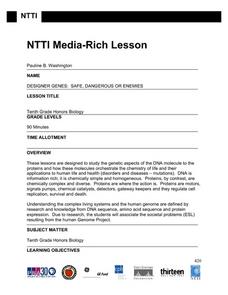Curated OER
Genetics and Heredity: The Next Generation
Tenth graders work in teams to order events of DNA transcription and translation protein synthesis. In the second lesson, they put the steps of mitosis and meiosis in order using a concept map poster. They use modeling clay to create...
Curated OER
Studying Plant Development Through Metabolic Activity
A hands-on activity which allows students to learn about cellular respiration. This lesson contains a range of investigations testing the rates of cellular respiration to demonstrate the relationship between metabolic rates of...
Curated OER
Raven Chapter 10 Guided Notes: Photosynthesis
Kim B. Foglia has designed a comprehensive series of AP biology worksheets. This one focuses learners on the progression of photosynthesis in plants. In this assignment, they identify structures and steps on high-quality diagrams, use...
Curated OER
Plant And Animal Cells
Students identify parts of plant and animal cells and describe the functions of each part. They distinguish between plant and animal cells. After a lecture/demo, students perform experiments which help them construct models of plant and...
Curated OER
Slimy cells
Students study the parts of a cell. In this chemistry lesson students complete an activity in which they make as much slime as they want.
Curated OER
The Giant Cell
After actively participating in a unit on cells, the middle schoolers act out and become the organelles. They will act out and explain the functions of what each of the organelles do for the cell.
Curated OER
Cells
Students are introduced to the life cycle of a cell. In groups, they identify and describe the function of organelles. They compare and contrast the differences and similarities between plant and animal cells as well. They complete a...
Curated OER
The Living Environment
Sixth graders show what they know about plant and animal cells. In this cell project lesson, 6th graders get to choose a project based on their learning style. They can create a visual representation of cells, auditory forms, or build a...
Curated OER
Transport in Plants
Quite a detailed and advanced look at the transport mechanisms of a plant. The absorption and control of sugar and water concentration are explained and will help an understanding of homeostasis concepts and organ specialization.
Curated OER
Cell-ebrations in Science
Students recognize that all living things are made up of cell and that they cannot easily be seen by the naked eye. Students become familiar with the use of microscopes as a tool for investigation.
Curated OER
Roots, Stems, and Leaves
In this plant learning exercise, students review the structure and function of roots, stems, and leaves. This learning exercise has 5 matching, 7 true or false, 4 multiple choice, and 10 fill in the blank questions.
Curated OER
A View of the Cell
For this cell worksheet, students will match 13 vocabulary words relating to cells to the correct definition. The cell vocabulary words cover all the parts of the cell plus eukaryotes, and prokaryotes.
Curated OER
Plants: Form and Function
In this plants worksheet, students compare and contrast vascular and non-vascular plants. Students learn the structure and function of the 3 types of plant tissues: dermal, ground, and vascular tissue. This worksheet has 27 fill in the...
Curated OER
Temperature and the Tomato
You will need a photovoltaic system and monitor at your school in order to obtain all of the data required to thoroughly implement this lesson plan. Your class monitors daily temperature and insolation amounts over a two week span of...
Forest Foundation
The Nature of Trees
Young botanists examine the different parts of tress and then draw parallels between the functions of these parts and the function of parts of the human body.
Curated OER
Support and Transport in Plants
All types of transport systems in a dicotyledon plant are detailed here, with clear labelled diagrams and notes for the specific structures and functions. The way that these systems have adapted, and how support is assisted by the...
Garden Earth Naturalist Club
Parts of a Flower! Flower Dissection
Sometimes the best way to learn about plants is to see the different parts of a plant yourself. Groups of learners dissect flowers to answer questions about what they observe and what they wonder about their flower.
Curated OER
Botany
For this botany worksheet, students read a 2 page article on botany, choose the multiple choice answer to 3 questions, determine if 3 statements are true of false and fill in the blanks in 5 facts about botany.
Biology Junction
Seed Plants: Gymnosperms and Angiosperms
One of the reasons plants found success on land relates to seed development. Scholars learn about many different forms of seeds and how they changed over time. It describes the structure and function of many different types of seeds in...
Curated OER
Biology: Understanding Cellular Organelles
Students distinguish the differences between Prokaryotic and Eukaryotic cells. Using microscopes, they examine a variety of plant and animal cells. Working in groups, they draw and label plant and animal cells and show the mathematical...
Curated OER
Feed Me, Seymour
Learners work in small groups to create posters illustrating the major facts and functions of plant organs. Within their groups, they assume the role of specialists creating specialized posters pertaining to the different parts of plants.
Curated OER
What is a Seed?
First graders identify the parts of a seed. In this plant biology lesson, 1st graders are given a seed and identify each part of the seed by using a hand lens. Students plant a seed and graph the growth.
Curated OER
Cellular Cellebrities
Sixth graders, in groups, learn the morphology and function of organelles within plant and animal cells.
Curated OER
Ferns and Gymnosperms
For this plant worksheet, students review the different characteristics of ferns and gymnosperms. This worksheet has 12 fill in the blank questions.

























